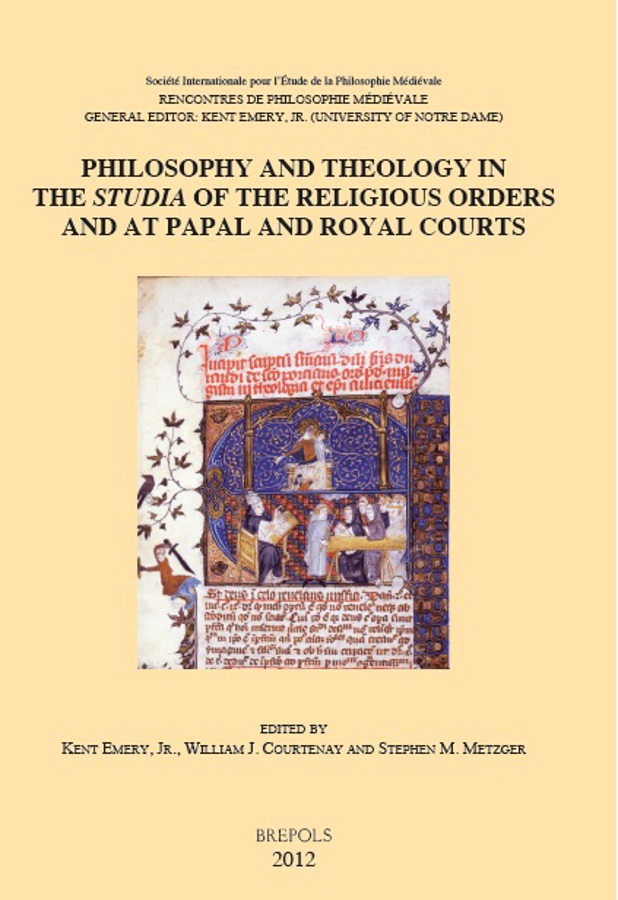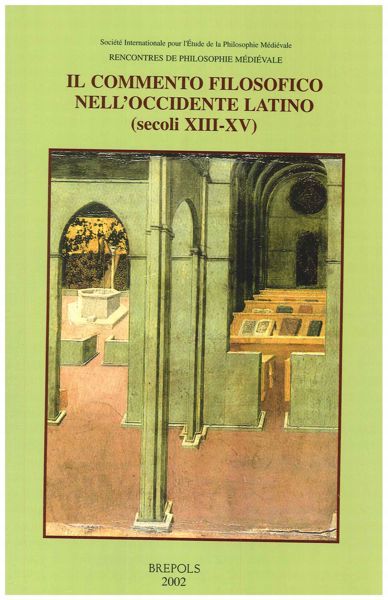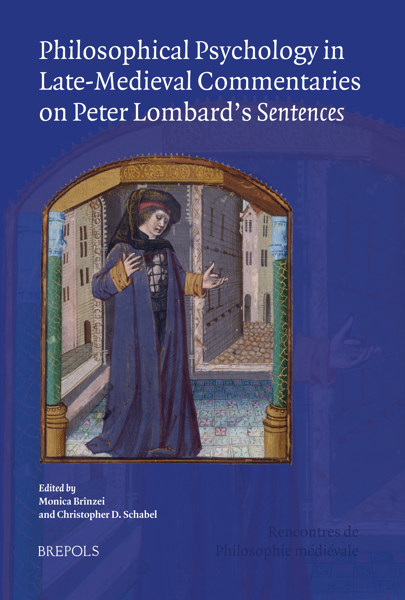
Philosophy and Theology in the 'Studia' of the Religious Orders and at Papal and Royal Courts
Acts of the XVth Annual Colloquium of the Société Internationale pour l’Étude de la Philosophie Médiévale, University of Notre Dame, 8-10 October 2008
K. Emery, Jr., W.J. Courtenay, S.M. Metzger (eds)
- Pages: 764 p.
- Size:170 x 240 mm
- Language(s):English, French
- Publication Year:2012
- € 85,00 EXCL. VAT RETAIL PRICE
- ISBN: 978-2-503-54326-0
- Paperback
- Available
- € 85,00 EXCL. VAT RETAIL PRICE
- ISBN: 978-2-503-54427-4
- E-book
- Available
"Das zentrale Anliegen des Bandes - die Abbildung des status quaestionis - wurde verwirklicht. Mal stärker, mal schwächer konturiert treten die Spezifika ordenseigener Ausbildungssysteme klar zu Tage und illustrieren das Bemühen um eine nicht nur angemessene, sondern profunde philosophisch-theologische Ausbildung. Weitere - hoffentlich ähnlich sorgfältig lektorierte - Bände sollten zukünftig dazu beitragen, die formulierten Forschungsdesiderate aufzuarbeiten." (Ralf Lützelschwab, in: Sehepunkte 13 (2013), Nr. 6 [20.01.2016], http://www.sehepunkte.de/2013/06/22150.html)
Most scholars know that the great universities were the institutional setting of Scholastic philosophical and theological activity in the later Middle Ages. Fewer realize, however, that perhaps far more Scholastic learning in the liberal arts and theology took place in the studia or study-houses of the religious orders, which out-numbered the universities and were more widely distributed across Europe. Indeed, most members of the mendicant orders received most or all of their learning in the liberal arts and theology in the studia of their order, and the most famous members of the orders (e.g., Albert the Great, Thomas Aquinas and John Duns Scotus) spent more time teaching in the studia than they did serving as Regent Masters in the university proper. As a consequence, the greater part of later medieval Scholastic literature was produced in the institutional context of the studia of the religious orders. Moreover, there were other significant institutional loci for Scholastic learning and discourse in the later Middle Ages besides the universities and the study-houses, namely the Papal Court—notably the Sacred Palace at Avignon—and several royal courts, for example, the courts of Robert the Wise in Naples and of the Emperor Lewis IV in Munich. It is not surprising, therefore, that many of the greatest Scholastic masters at different times taught in, or were associated with, all of these venues. This volume, which originated at the XVth annual Colloquium of the Société Internationale pour l’Étude de la Philosophie Médiévale held at the University of Notre Dame (USA) in October 2008, contains essays concerning the study and teaching of philosophy and theology in the studia of the Dominicans, Franciscans, Augustinian Hermits, Carmelites, Benedictines and Cistercians, as well as the intellectual activity at the Papal Court in Rome and Avignon and at various royal courts (London, Naples, Munich).
Contributions by: Fabrizio Amerini, Luca Bianchi, Alain Boureau, Stephen F. Brown, Amos Corbini, William O. Duba, Russell L. Friedman, Hester G. Gelber, Joseph Goering, Wouter Goris, Guy Guldentops, Jacqueline Hamesse, Maarten J.F.M. Hoenen, Roberto Lambertini, Alfonso Maierù, Michèle Mulchahey, Patrick Nold, Adriano Oliva, OP, Alessandro Palazzo, Giorgio Pini, Sylvain Piron, François-Xavier Putallaz, Christopher D. Schabel and Garrett R. Smith, Neslihan Şenocak, Thomas Sullivan, OSB, Christian Trottmann, with an introduction by Kent Emery, Jr. and an epilogue by William J. Courtenay.
Kent Emery, Jr., Introduction
I. The Dominicans
Alfonso Maierù, Dominican studia in Spain
Joseph Goering, What the Friars Really Learned at Oxford and Cambridge
Adriano Oliva, OP, L’enseignement des Sentences dans les studia dominicains italiens au XIIIe siècle : l’Alia lectura de Thomas d’Aquin et le Scriptum de Bombolognus de Bologne
Alessandro Palazzo, Philosophy and Theology in the German Dominican scholae in the Late Middle Ages: The Cases of Ulrich of Strasbourg and Berthold of Wimpfen
Guy Guldentops, Struggling with Authority: Durand of Saint-Pourçain on the Origin of Power and on Obedience to the Pope
Fabrizio Amerini, The Reception of Thomas Aquinas’ Philosophy in the Dominican studia of the Roman Province in the Fourteenth Century
Hester Goodenough Gelber, Blackfriars London: the Late Medieval studium
Maarten J.F.M. Hoenen, How the Thomists in Cologne Saved Aristotle: The Debate over the Eternity of the World in the Late-Medieval Period
II. The Franciscans
Neslihan Şenocak, The Franciscan studium generale: A New Interpretation
Luca Bianchi, Aristotle Among Thirteenth-Century Franciscans: Some Preliminary Remarks
Alain Boureau, Enseignement et débat dans les ordres mendiants du XIIIe siècle : Le cas des Quodlibeta de Richard de Mediavilla
William O. Duba, The Legacy of the Bologna studium in Peter Auriol’s Hylomorphism
Sylvain Piron, Les studia franciscains de Provence et d’Aquitaine (1275-1335)
Christopher Schabel and Garrett R. Smith, The Franciscan studium in Barcelona in the Early Fourteenth Century
François-Xavier Putallaz, La peine de mort est-elle légitime ? Le studium franciscain de Cologne s’interroge au XIVe siècle
III. The Augustinians and the Carmelites
Giorgio Pini, Building the Augustinian Identity: Giles of Rome as Master of the Order
Russell L. Friedman, How ‘Aegidian’ Were Later Augustinian Hermits Regarding Intellectual Cognition? Gerard of Siena, Michael of Massa and the Object of the Intellect
Stephen F. Brown, The Early Carmelite Parisian Masters
Wouter Goris, The Critique of the Doctrine of God as First Known in the Early Carmelite School
IV. The Benedictines and the Cistercians
Thomas Sullivan, OSB, Ut nostra religione refloreat studium: The studia of the Monastic Orders
Amos Corbini, Pierre de Ceffons et l’instruction dans l’Ordre cistercien : quelques remarques
V. The Friars, Philosophy and Theology at Papal and Royal Courts
M. Michèle Mulchahey, The Dominican Studium Romanae Curiae: The Papacy, the Magisterium and the Friars
Jacqueline Hamesse, Les instruments de travail philosophiques et théologiques, témoins de l’enseignement et de l’influence des ordres mendiants à l’époque de la papauté d’Avignon
Patrick Nold, How Influential Was Giovanni di Napoli, OP, at the Papal Court in Avignon?
Christian Trottmann, La vision béatifique, question disputée à la cour pontificale d’Avignon ?
Roberto Lambertini, Political Theory in the Making: Theology, Philosophy and Politics at the Court of Lewis the Bavarian
William J. Courtenay, Concluding Remarks
Index of Manuscripts
Index of Ancient and Medieval Names
Index of Modern and Contemporary Authors




